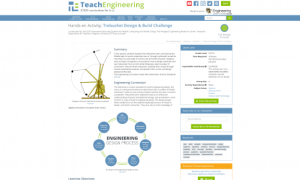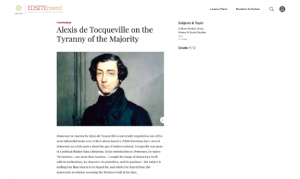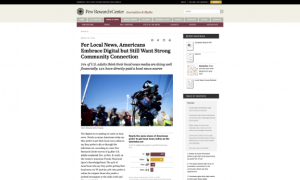Scout Report: Climate, Design and Build, Engineering, Alexis de Tocqueville, Mnemosyne, Journalism, White Lies True Crime, Audio Storytelling
GENERAL INTEREST
Back to Top |
 |
|
CLIMATE FEEDBACK
|
SCIENCE |
|
|
|
Media attention to climate change has been increasing over the past several years, but not all articles on the subject are entirely accurate, and it can sometimes be difficult for non-expert readers to separate the wheat from the misleading chaff. To help with this quandary, Climate Feedback reviews high-profile climate change articles from a wide variety of publications, then annotates and verifies or rebuts their claims. This effort is carried out by dozens of scientific experts from around the world volunteering their assistance. Founded by climate scientist Dr. Emmanuel Vincent, Climate Feedback is a nonprofit, nonpartisan organization that describes itself as "a worldwide network of scientists sorting fact from fiction in climate change media coverage [whose] goal is to help readers know which news to trust." Each selected piece is reviewed at either the article- or claim-level by multiple experts in relevant fields. Visitors can browse concise summaries of experts' assessments of the reviewed articles, and they can also read each reviewer's overall feedback as well as the full, line-by-line annotations in the context of the original article. Climate Feedback has been cited by numerous media outlets, including Ars Technica, The New York Times, and The Guardian. [JDC]
|
|
|
|
|
 |
|
TEACHENGINEERING: TREBUCHET DESIGN & BUILD CHALLENGE
|
SCIENCE |
|
|
|
STEM teachers looking for a hands-on unit to pique their students' interest in engineering may want to check out this activity available through TeachEngineering. This activity introduces students to the trebuchet, a compound machine developed in the Middle Ages as a siege engine that can be seen today in events like Punkin' Chunkin'. Created with students in grades seven to nine in mind, the Trebuchet Design & Build Challenge takes place over ten 60-minute class periods. During this challenge, students work as teams to "design and build their own trebuchets from scratch while following a select number of constraints." They later test their designs, collect data, use quantitative analysis to evaluate their trebuchet's performance, and then give presentations on their design process and results. The Trebuchet Design & Build Challenge was developed as part of the Research Experiences for Teachers Program in the NASCENT (Nanomanufacturing Systems for Mobile Computing and Mobile Energy Technologies) Engineering Research Center at the University of Texas at Austin. TeachEngineering is a digital library of standards-aligned K-12 STEM teaching resources whose development was funded by the National Science Foundation and is currently managed by the University of Colorado-Boulder and Oregon State University. [JDC]
|
|
|
|
|
 |
|
ALEXIS DE TOCQUEVILLE ON THE TYRANNY OF THE MAJORITY
|
SOCIAL STUDIES |
|
|
|
Instructors of US history, civics, or social studies may be interested in this set of three lesson plans from EDSITEment, the National Endowment for the Humanities' online collection of free teaching resources. These standards-aligned lessons focus on Chapter 7 in Volume 1, Part 2 of Alexis de Tocqueville's influential tome Democracy in America, in which Tocqueville lays out his arguments about the dangers of the "tyranny of the majority." Since Tocqueville can be a challenging author, these lessons are designed "to encourage both teachers and students to work through Tocqueville's argument by breaking it down into its component parts." Each lesson takes place over one class period, with the first introducing Tocqueville's claims about the "omnipotent" power of the majority, then the second lesson examines Tocqueville's reasoning about the dangers of unchecked power, while the third lesson concludes the unit by weighing Tocqueville's argument that "there is no freedom of mind in America," in comparison to Europe. Worksheets with excerpted passages from Democracy in America are included, as are links to the full text, suggestions for assignments, and other resources. This lesson unit is intended for high school classrooms, but anyone interested in considering Tocqueville's work may also find it a helpful reading guide. [JDC]
|
|
|
|
|
 |
|
PEW REPORT: FOR LOCAL NEWS, AMERICANS EMBRACE DIGITAL BUT STILL WANT STRONG COMMUNITY CONNECTION
|
SOCIAL STUDIES |
|
|
|
How do Americans prefer to get their local news in the digital era? What do they want their local news to provide, and how successful do they feel their local media are at meeting their expectations? These are just some of the questions addressed in this report published by the Pew Research Center in March 2019. This report is based on a large survey of 34,897 U.S. adults conducted by the Center between October 15 and November 8 in 2018. Among the report's many findings, 37 percent of Americans prefer to get their local news online, while 41 percent still prefer television. Most have generally favorable views of their local media and value media with a strong connection to their community, but 71 percent believe their local news outlets are doing well financially, while only 14 percent report having paid for local news in the past year. Those interested in further details can read the 123-page report online or download it as a PDF at the link above. The survey's topline questionnaire results are also available for download. Additionally, readers should be sure to check out this report's accompanying interactive feature where they can explore the local news dynamics in 99 geographic areas around the U.S. [JDC]
|
|
|
|
|
 |
|
MNEMOSYNE: MEANDERINGS THROUGH ABY WARBURG'S ATLAS
|
ARTS |
|
|
|
German Jewish art historian and cultural theorist Aby M. Warburg's Mnemosyne Atlas is an unfinished attempt to trace the importance of powerful themes in Western antiquity that emerge and re-emerge over time. This digital version of the Atlas, created by Cornell University and the Warburg Institute of the University of London, lets users explore guided pathways for ten panels of the Mnemosyne Atlas. For example, Panel 70, "The Pathos of the Baroque in the rape [of Proserpina]. Theater)," deals with reason and the lack of reason in the West, with guidance from experts Jane O. Newman, professor of comparative literature and European languages and studies at the University of California-Irvine and Laura Hatch, a Ph.D. student at UC-Irvine. Users can Browse Panels, clicking a panel to view an image of it and open options for its guided pathway. There is also a list of nine overlapping Mnemosyne Themes, accessible via the About tab. These themes link to the panels in which they appear and include topics like ancient cosmology, theatricality and anatomy, and the legacy of Greek astronomical thought. A section of suggested Readings by and about Warburg, as well as readings related to each panel, completes the site. [DS]
|
|
|
|
|
THEME: INTERNATIONAL PODCAST DAY |
Pages: 1 · 2
Culture and Arts, Money and Computing, Health, Fitness and Style, News and Issues, Literature and Poetry, History, Culture Watch, Health and Science, The Internet, Issues, Interests, Learning, Senior Women Web, Articles, Sightings, What's New




